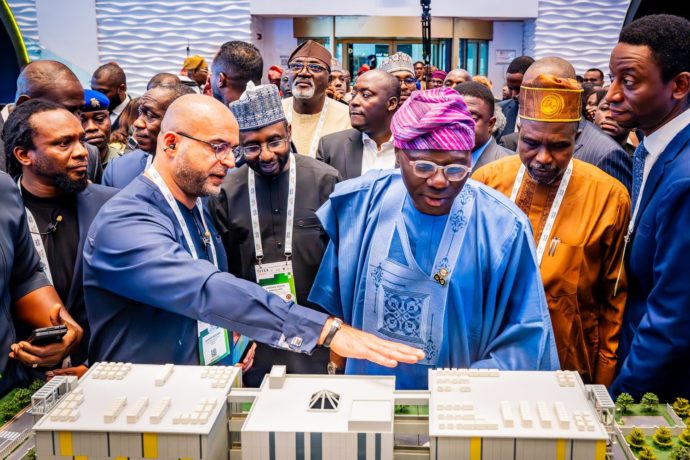
Nigeria’s tech ecosystem has long been celebrated for its grit and determination. The word most often used to describe it is resilience. At the recent GITEX Nigeria Tech Expo and Future Economy Conference in Lagos, that word echoed across stages and conversations. Founders, investors, and policymakers applauded Nigerian innovators who thrive despite economic and structural challenges.
But the constant repetition of resilience highlighted a deeper truth: grit alone cannot sustain growth. Innovation needs more than determination. It requires deliberate support, funding, and infrastructure.
Lagos at the Centre of African Innovation
Governor Babajide Sanwo-Olu used the event to declare Lagos a launchpad for Africa’s digital future. With over 600 startups and a growing list of unicorns, Lagos already leads in technology innovation. Its startups continue to solve pressing problems, from digital payments to logistics, often under conditions where resources are scarce.
Speakers described the city as a mega high-speed testbed where innovation is born out of necessity. This framing reflects the unique challenges of Nigeria’s market. Entrepreneurs must constantly adapt, finding new ways to serve customers with limited infrastructure, irregular power supply, and tough regulatory environments.
Resilience: A Strength and a Limitation
Nigerian founders are known worldwide for their resilience. They build businesses in an environment where access to credit is limited, policies shift often, and inflation affects everyday operations. Yet, resilience should not be the main story forever.
Calling startups resilient without addressing systemic barriers risks romanticizing struggle. It frames survival as success when what truly drives long-term growth is sustainability, funding, and supportive policies. Grit can spark innovation, but it cannot replace access to capital or human development investments.
The Funding Gap in Nigeria’s Startup Ecosystem
Nigeria continues to attract global venture capital. In 2024, startups raised more than 400 million dollars in foreign funding. Moniepoint alone secured over 100 million dollars to achieve unicorn status. These investments highlight confidence in Nigeria’s entrepreneurial talent.
However, most of this funding originates from outside the country. Domestic support from government institutions and local investors remains limited. Without public sector commitment, the ecosystem risks over-reliance on external capital that may shift with global economic tides.
A robust innovation economy requires balanced support. International investors bring credibility and scale, but local governments must demonstrate belief in their own entrepreneurs by providing structured funding.
Why Public Investment Matters
Public funding builds trust. When governments back startups through innovation funds, it signals to private investors that the ecosystem is worth supporting. It also provides early-stage capital to founders who may not yet qualify for international investment.
Industry leaders at GITEX Nigeria called for intentional policies and funding programs. They stressed that Nigeria cannot simply celebrate resilience while neglecting the tools innovators need to compete globally. A sustainable ecosystem demands both resilience and resources.
Human Capital: Building the Workforce of the Future
Funding alone is not enough. The ecosystem must also invest in talent. Nigeria graduates fewer than 4,000 STEM students annually, while countries like China produce millions. Without addressing this gap, Nigeria risks running out of skilled professionals to drive its digital economy.
Programs like the Three Million Technical Talent initiative are steps in the right direction. However, they require long-term commitment and serious investment. A vibrant startup ecosystem depends not only on great ideas but also on a skilled workforce capable of scaling those ideas into global businesses.
Policy Progress and Remaining Gaps
Some progress has been made. The Nigeria Startup Act and digital finance policies like the 2012 cashless initiative have created opportunities. Partnerships with international governments have also seeded new funding pools, supporting early-stage startups.
Yet, gaps remain. Regulatory uncertainty and inconsistent infrastructure continue to slow growth. Entrepreneurs must often navigate shifting rules, high costs, and unreliable services. These challenges cannot be solved by resilience alone. They demand structured government action.
Lagos Leading by Example
Lagos is beginning to set the pace for innovation funding. The Governor announced plans to dedicate 1.5% of the state’s capital budget to an innovation fund. This new initiative builds on the earlier one-billion-naira LASRIC fund, which supported about 40 startups.
Although this figure is still small compared to the billions raised globally, it demonstrates a step toward creating local funding sources. If expanded and replicated across states, such funds could transform Nigeria’s startup economy.
Moving From Words to Action
GITEX Nigeria revealed both the strength and the fragility of Nigeria’s tech ecosystem. On one hand, founders continue to innovate under extraordinary conditions. On the other hand, the constant reliance on resilience underscores a lack of structural support.
For Nigeria to truly cement its place as Africa’s technology leader, the narrative must shift. The ecosystem needs more than praise for endurance. It needs real investment in startups, infrastructure, and talent pipelines.
Conclusion: Redefining the Narrative
Resilience is a powerful trait, but it should not be the headline forever. The future of Nigerian innovation depends on translating grit into growth through structured funding, policy support, and talent development.
If government and private investors align with this vision, Nigeria can become not just a hub of survival-driven innovation but a global centre of sustainable growth. GITEX Nigeria highlighted the opportunity. Now, the task is to move beyond resilience and invest in results.



